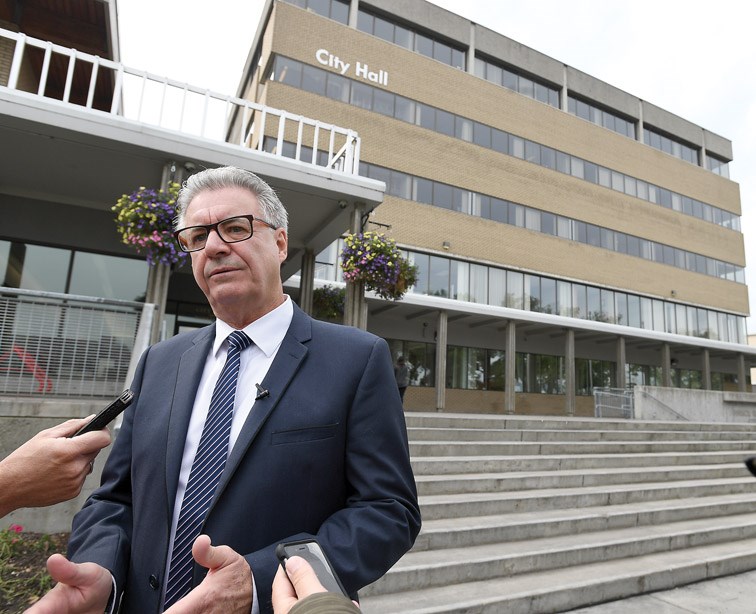Lyn Hall says there’s not a day goes by as mayor of Prince George that he doesn’t think of what the city can be doing better to tackle the societal problems of our downtown.
Increasing crime, housing shortages, parks employees having to dismantle homeless campsites and clean up drug needles and human excrement, and the cost to taxpayers of replacing trees destroyed by vandalism were some of the concerns Hall raised in front of city council Monday night.
In response, council approved a motion to host a public meeting before the end of the year to hear the concerns of private individuals, business owners, social agencies and other stakeholders and to try to come up with some solutions to the increasing problems shared with virtually every city in Canada.
“What we as a city can control is a fraction of what’s taking place downtown,” said Hall. “We can control RCMP and bylaw services and those kinds of things. We aren’t in the housing business, though we can be a partner. We’re not in health or crime reduction, that’s not our bailiwick, but we can be partner and we’ve shown that partnership with the integrated health model.”
Hall pointed to the success of city-hired private security at public buildings such as City Hall, the Civic Centre, Four Seasons Pool, and Rolling Mix Concrete Arena brought in as a necessity in response to public safety concerns. He also made note of steps the city has taken to tackle poverty and homelessness in the community by setting up two public washroom facilities in the downtown core and providing free storage space and the establishment of a RCMP Downtown Safety Unit also staffed with bylaw compliance officers to deal with squatters’ camps. Hall said the city in 2018 spent $1.2 million on cleanup initiatives and said that figure is likely to hit $1.5 million in 2019.
“Public works has had the most dramatic impact,” said Hall. “The cleanup of homeless camps in our community has really taken away from what we traditionally know as our parks department and what they do to keep our parks clean and upgraded to a standard we’ve come to enjoy.
“These folks are now dealing with hazardous materials, from needles to excrement, they’re having to tear down homeless camps. That concerns me that we’re having to deal with it, not just in our city, downtown, but in our entire community. Day-in and day-out we’re dealing with this issue and it’s not as if we turn a blind eye to it. There’s no golden remedy to create a fix for it. Every municipality is suffering with the same issue, and that's not an excuse. We understand we need to do something.”
The influx of people dependent on social agencies for the basic necessities rose sharply following the July 2017 wildfire evacuations. The resources of social agencies and city departments was spread thin and has created more visible reminders of the economic, health and social problems the city now faces daily.
“No doubt about it, and we were told that by other partner groups, we received 10,000 people that we took care of, and in 2018, not as many,” said Hall. “Some folks stuck around because we’re a big hub city. This is the largest hub city in northern B.C. We have services and if you require services the tendency was to stay and access those services. That doesn’t just put a strain on a city, but it also impacts our partner groups, BC Housing and our health authorities.
“Everybody is doing what we can, and this public meeting will give us some ideas, and let’s see what we can do with them.”
Coun. Frank Everitt told council segments of downtown problems are spreading into the suburbs of the Hart and College Heights and said the city requires immediate action from the provincial and federal governments to help deal with an increasing epidemic of drug addiction. He welcomes input at the meeting from the public and social agencies to find new ways to address council’s concerns.
Coun. Cori Ramsay said the city continues to work at tearing down derelict buildings which she said is transforming downtown, but there are many more initiatives which are invisible but are also having a positive impact.
Council spent two days last week in strategic planning talking about what to do with downtown.
“It is a crisis, it is an issue, and it’s an important conversation to have, and it didn’t start at (strategic) planning last week, this has been going on my entire time in council, a full year, and it’s been going on before that, ” said Coun. Kyle Sampson, whose motion to have a public meeting at City Hall passed unanimously.
Sampson wants to have details of the public meeting sorted out before the next council meeting in two weeks.
“Bringing those ideas together in a public meeting where we’re all going for the same goal, which is a better downtown, is going to be productive,” said Sampson. “It’s going to be packed in here, were going to do video conferencing in the room next door and there’s going to be an opportunity for folks to watch back home. I want to move this along fast.”



